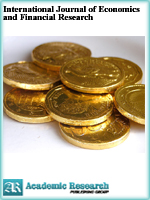International Journal of Economics and Financial Research
Online ISSN: 2411-9407
Print ISSN: 2413-8533
Print ISSN: 2413-8533
Quarterly Published (4 Issues Per Year)

Archives
Volume 4 Number 10 October 2018
The Impact of E- Banking on Commercial Banks’ Performance in Namibia
Authors: Loide David ; Dr. Teresia Kaulihowa
Pages: 313-321
Abstract
This paper examines the impact of e-banking on commercial banks’ performance in Namibia using an error correction modelling and granger causality test for the period 2012M1 to 2015M8. The advent of the internet has resulted in paradigm shifts in the banking industry towards electronic banking to create a competitive edge over rivals. Although this rapid development of information technology has made some banking tasks more efficient and cheaper, there are concerns that technological investments are taking a larger share of bank’s resources. The finding reports that return on investment is significantly driven by interbank settlement systems, electronic funds transfer and cheques, with an adjustment of 32 percent per month. The direction of causality test reveals a unidirectional causality from return on investment to interbank settlement system and cheques. This indicates that an increase in the return on investment is likely to enhance innovations and development. The study also found a bidirectional causality between the volume of electronic funds transfer and return on investment. Policy implications emanating from this study suggest that stable macroeconomic conditions that enhance return on investment are good stimulant to drive innovations and technology that will ultimately increase economic development.
Oil and Gas Production and the Growth of Ghana’s Economy: An Initial Assessment
Authors: Elijah Acquah-Andoh ; Denis M. Gyeyir ; David M. Aanye ; Augustine Ifelebuegu
Pages: 303-312
Abstract
Oil and gas resources present enormous opportunities for the economic development of low income economies, but poor management of these resources can result in dire consequences for the foundations of the resource-endowed nation. The discovery of oil and gas in Ghana is as significant as the policies and measures to ensure optimum benefits to the nation. This paper evaluates the sustainability of petroleum production in the light of the medium term policy structure, the Ghana Shared Growth and Development Agenda (GSGDA). In particular, the economic contribution of oil and gas to Ghana’s GDP and sustainable investment options for petroleum revenues were examined using ordinary least squares (OLS) regression. The evidence suggests that at current production levels, petroleum is not a significant contributor to Ghana’s GDP after adjusting for the contribution from other sectors of the economy. The consistent appreciation of Ghana’s real effective exchange rate between 2010 and 2013 led to a deterioration of the competitiveness of the non-oil sector and declining contribution of the agricultural sector to GDP; and further eroded the net impact of petroleum production. Investing petroleum proceeds in the non-oil sector and expansion of the export base are a viable option for utilising petroleum revenues.



